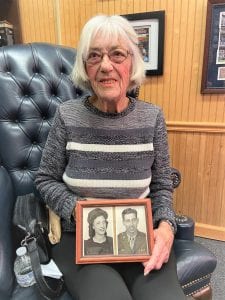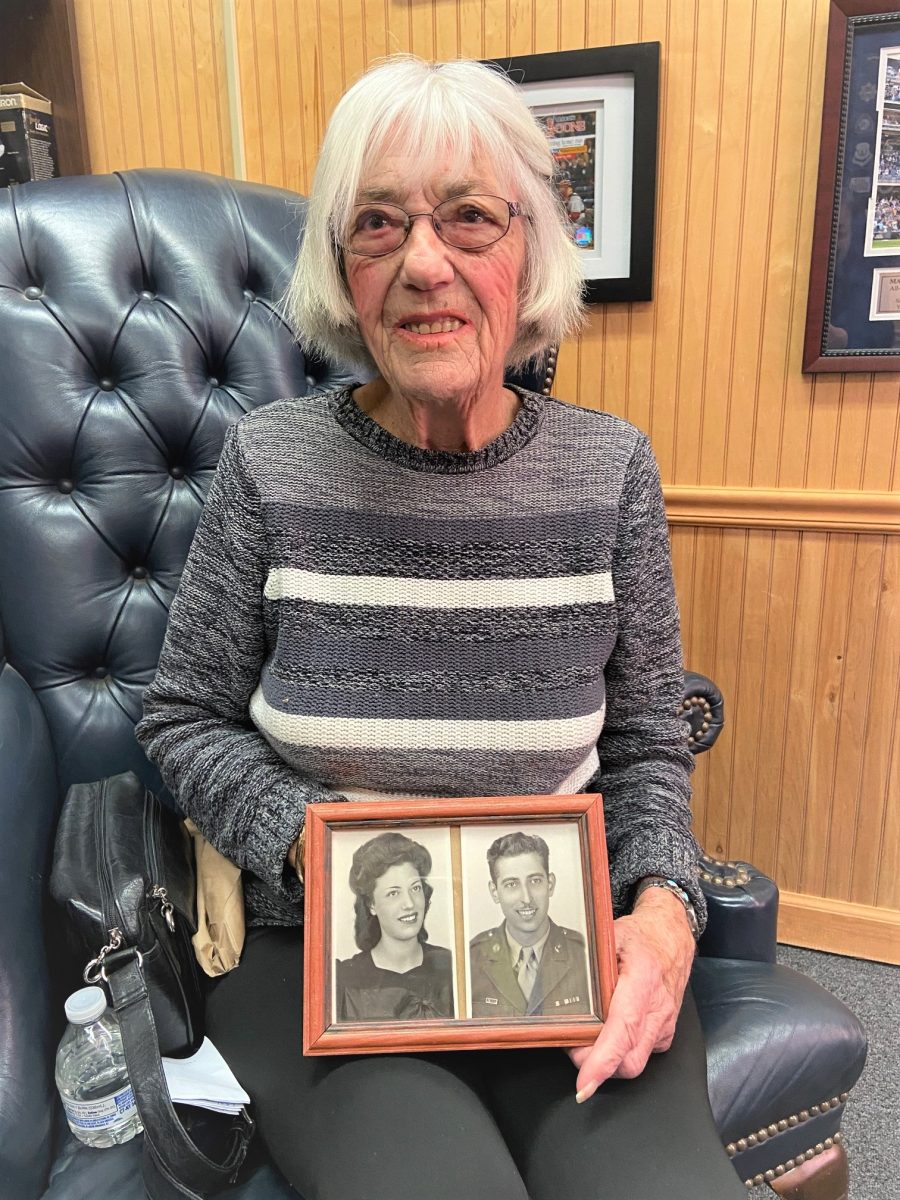
Westfield resident Jean Dudas, 93, holds a framed photo of herself and husband Michael, taken around the time they met in 1942. (HOPE E. TREMBLAY/THE WESTFIELD NEWS)
WESTFIELD – Jean Dudas is a proud American and has been one since 1947.
Born in Black Heath, England, she grew up during The Blitz, a German bombing campaign against London during World War II. At age 13 she was evacuated with other children to the coast to keep them from harm’s way. But as Dudas recalled, she preferred the bombs if it meant she could be with her parents.
“I wasn’t happy there. I was there three weeks and wrote for my mum to come get me,” she said, adding that “she did.”
Dudas, 93, had a tough life, as did everyone in the London area at that time.
“It was a terrible time,” she said. “Every day there were bombings and one hit our house.”
She remembered that the bombs, even if they did not hit your house, would cause windows – and toilets – to shatter.
“We had no windows,” she said. “They were all boarded up. It was a waste of time to repair the windows. And the government would replace the toilets.”
Even with WWII going on around her, Dudas graduated from high school at 16 and at 17, everything changed at a Red Cross dance.
“We used to go to the Tea Dances in the afternoon and then there was a dance every night at 8 p.m. at Covent Garden,” she said.
Dudas and her friends frequented the dances, which had all-female bands since the men were at war. Most of the men who attended the dance were soldiers from other countries, including Michael Dudas, a U.S. Army soldier from Westfield.
The pair danced the day they met, and continued dancing until Michael Dudas died 24 years ago. They were married for 50 years.
Dudas said they married in 1944, two years after they met. Her husband was stationed about 100 miles away from her family’s suburban home in Kent, but would visit every chance he got. Dudas said in 1946 he was getting ready to be stationed in Japan and she was set to go to the United States, with her sister-in-law as her sponsor, but then Hiroshima was devastated by the nuclear bomb and they went to America together.
The Dudas’ settled in Westfield with family. While Michael Dudas worked at United Technologies, Jean Dudas would spend her days getting to know her new home city on foot.
“I walked everywhere,” she said, “I made friends along the way and one day I was talking to someone on Maple Street and was asked if I needed an apartment, which I did. There was one on the second floor – it was $18 a month, and we took it.”
Not long after, the first of two sons of Jean and Michael Dudas was born. One day, while taking a walk, the Dudas’ came upon their second opportunity for a home. This one was a house for sale, and Jean Dudas still lives there today.
Dudas said becoming a U.S. citizen was something she wanted to do from the start.
“I was going to live here, so I should be a citizen,” she said.
Dudas acclimated quickly to life in Westfield. She said it wasn’t too far of a stretch from her suburban hometown of Black Heath, but a far cry – and welcome change – from the bombings in London.
After raising her sons, Dudas became a volunteer in the Westfield Public Schools, where she continues to volunteer today as a guest reader at Franklin Avenue Elementary School. Dudas is a regular at the Southwick Senior Center, which she enjoys because of the small group atmosphere. She also serves on the Senior Center Board and she knits shawls for local nursing homes as well as blankets for preemies at Baystate Medical Center. Dudas is a lifetime member of the Veterans of Foreign Wars’ Auxiliary.
While Dudas fully considers herself an American, she does send a card to the Queen Mum every year.
“I always send a birthday card to the Queen, and she always writes back,” said Dudas.
Dudas remembers that the years in between graduating high school and marrying Michael Dudas were good times, despite the war.
“At that time, you had to go to work, and you were given a choice,” she said. “You could be a ‘land girl’ and work on a farm, or you could be a ‘bus conductress,’ which is what I did.”
As a bus conductress, Dudas would collect fares on a platform from passengers as they boarded the bus. Once she was married, she gave up her job.
Dudas repeated that it was often terrible to live in WWII London and its outskirts.
Dudas recalled that every family was given a galvanized steel air raid shelter, which looked like a small metal shed.
“Most families just put them on the ground, but my father dug a hole and set it down into the ground,” she said. “It had a bunkbed for me and my mum and dad had a sleeping cot.”
Dudas’ brother was in the armed forces and was stationed around the world at that time.
Looking back, Dudas said she probably took a lot of risks back then, such as taking the train home alone from the dances late at night before meeting her husband. But at the time, she didn’t think anything of it.
“I took a lot of chances,” she said.
When asked what advice she would give young people, Dudas said she didn’t have any and that she is sometimes told by her daughter-in-law that she doesn’t understand today’s ways.
“I think they don’t understand,” she said. “What would people do today if something terrible happened? What if we got bombed? They wouldn’t know what to do!”
Dudas also said she doesn’t understand what people call dancing today.
“I loved the Foxtrot,” she said. “Michael was the dancer, though, but today it seems dancing is just waving your hands in the air.”
Dudas has returned to England more than 30 times since moving here and becoming a U.S. citizen. She brought her husband and sons many times and said her mother often visited them in Westfield, which she said is most certainly her home.








